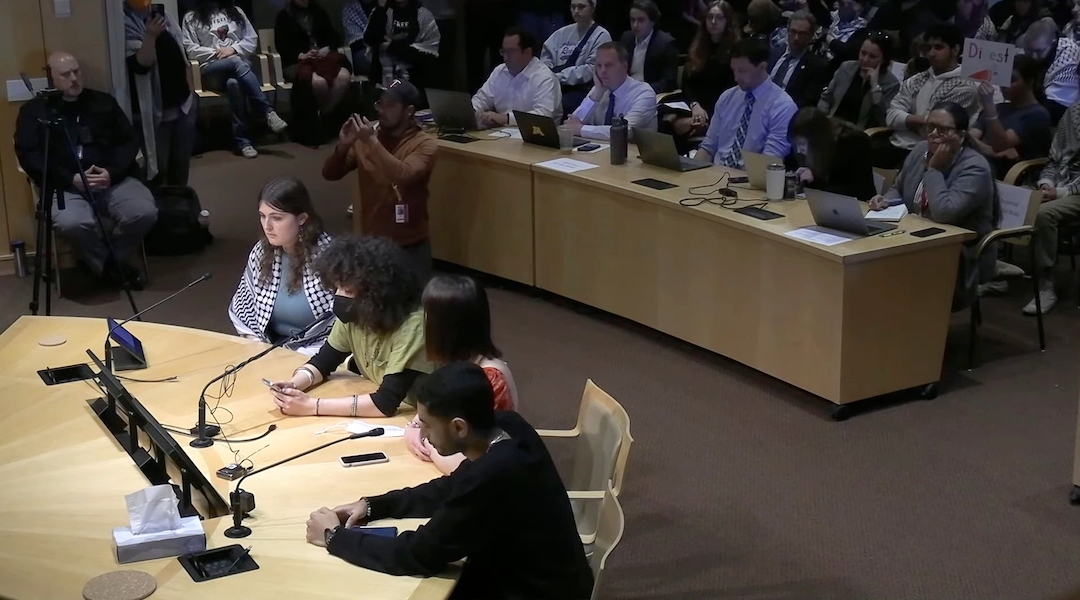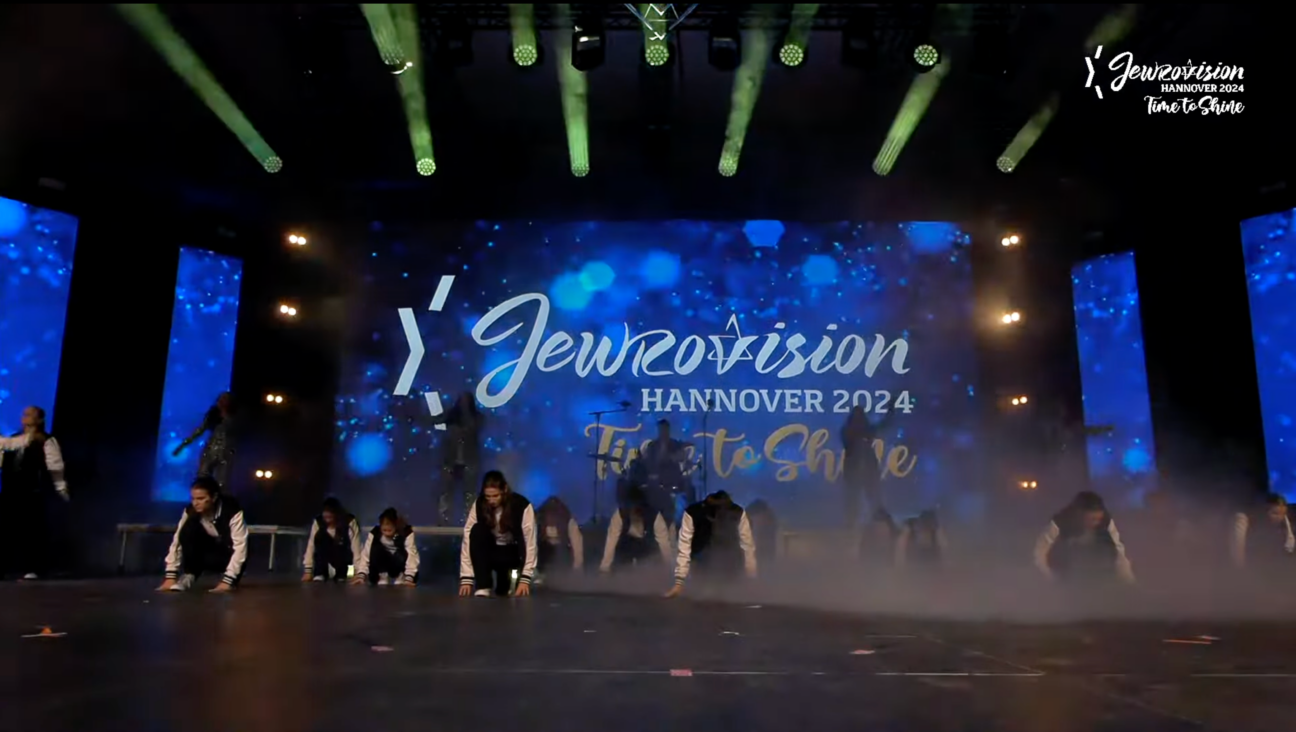Steve Guttenberg, and his very Jewish life, take the stage for a play adaptation of his memoir

Guttenberg plays himself in “Tales From the Guttenberg Bible.” (Adam Wingman)
(JTA) — Actor Steve Guttenberg has had the kind of career that put him in touch with nearly every trend in Hollywood. There were prestige films like “Diner” and “Cocoon” and the lighter but wildly successful fare like the first four movies in the “Police Academy” series. “Three Men and a Baby” was the biggest American box office hit of 1987; the 2004 Christmas movie “Single Santa Seeks Mrs. Claus” somehow spawned a sequel.
In short, it’s the kind of career that would inspire a juicy, dishy memoir, which it did when he wrote “The Guttenberg Bible” in 2012.
Now a brand new stage adaptation, “Tales From the Guttenberg Bible,” is playing through May 21 at the George Street Playhouse in New Brunswick, New Jersey. Guttenberg plays himself in the show, in which he explores his career, his Judaism and much more.
“As a tradition and as a culture, [Judaism’s] been a huge part,” said Guttenberg, who was born in Brooklyn in 1958 and raised in Massapequa, on Long Island. “My family didn’t observe Friday nights, but my father was kosher… I was bar mitzvahed, and then when I went out to California when I was 17, I found the temple to be a great respite for me, especially from the loneliness.”
For years, Guttenberg regularly attended the Stephen Wise Temple in Los Angeles, and later joined Kehillat Israel in Pacific Palisades.
The show features four actors playing 90 different characters, including the Jewish movie producers Allan Carr and Robert Evans, the voiceover actor Michael Bell (who is Guttenberg’s godfather), as well as Paul Reiser, Merv Griffin and Kevin Bacon. It covers Guttenberg’s life from age 17 — when he famously snuck onto the Paramount Pictures lot, set up an office and sometimes claimed to be the stepson of then-Paramount executive Michael Eisner — through his late 20s.
“It’s been such a great career, and I’ve really enjoyed it,” Guttenberg said. He said that Julian Schlossberg, the veteran producer of movies and theater, read the book and told him that he thought there was a play in it.
“So I started writing it into a play,” he said, and Schlossberg thought they should bring it to “a great regional theater.”
Guttenberg is not new to the stage, having made his Broadway debut in the early 1990s, and later appearing in “Relatively Speaking,” the Schlossberg-produced, one-act anthology that played in 2011 and 2012. Guttenberg appeared in the one-act play written by Woody Allen, while the other two were by Ethan Coen and Elaine May.
But the actor’s relationship with Schlossberg goes back much further. One of his first movie parts was in the 1978 thriller “The Boys from Brazil,” which was about a Jewish Nazi hunter (Laurence Olivier) tracking Nazis in South America. Schlossberg, hosting a radio show at the time, proclaimed Guttenberg a “talent,” on a broadcast that Guttenberg’s mother happened to hear, leading her to call in.
Schlossberg, author of a recent memoir about his own adventures in showbiz, described Guttenberg as a “nice Jewish boy” in an interview with the Jewish Telegraphic Agency earlier this year.
Although he was seen more recently on TV in “The Goldbergs,” “Party Down” and “Dancing with the Stars,” Guttenberg mostly stepped away from acting for about five years to care for his ailing father, who passed away last July. That, along with the pandemic, had put the play on the back burner.
When asked which of his movies he’s asked about the most, Guttenberg names “Short Circuit” (a 1986 sci-fi comedy) and “The Bedroom Window” (a 1987 thriller) in addition to “Three Men and a Baby,” “Police Academy” and “Cocoon.”
“‘Can’t Stop the Music’ gets a lot of play. And of course, ‘The Day After,’” he said, referring to Nancy Walker’s 1980 musical comedy and the groundbreaking 1983 TV movie about a nuclear apocalypse. Guttenberg said he was “lucky enough that I have five or six or seven old movies that people ask about.”
Guttenberg has warm memories of Leonard Nimoy, the Jewish actor and “Star Trek” icon who directed “Three Men and a Baby.”
“As a person, he was a ball of fire inside an iceberg,” Guttenberg said of Nimoy, who died in 2015. “Very stoic, but extremely warm and loving. The first time I met him, he asked if I had his mother’s stuffed cabbage… a terrific artist, an incredible acting teacher, a well-versed writer, photographer, and director.”
While “Police Academy” — about an inept bunch of cops — is a rare franchise from the 1980s that has never had any kind of remake or reboot, Guttenberg said that there have been about “10 scripts developed” over the years, including from such big names as Jordan Peele. He added that Taika Waititi, the Jewish director of “Jojo Rabbit,” is “developing one now, or thinking about it.”
Even though his acting took a back seat in recent years, Guttenberg noted that he enjoyed his run as a science teacher on “The Goldbergs.” The long-running, soon-to-conclude ABC series about a suburban Jewish family is set amongst the popular culture of the 1980s — so it has touched on several of his movies.
“I like [creator Adam F. Goldberg] a lot, and I think any time that we can give support to shows that have Jewish culture in them, that, as a Jewish person, you’ve got to lend your name to it, especially with all that’s going on,’” he said.
After the New Jersey run, Guttenberg will bring the show to Sag Harbor’s Bay Street Theatre in August, and, he and the producers hope, other engagements beyond that.
“I think it’s a great play, and I think we’re gonna be able to play it all over the country and in different cities, and one day back in New York.”
This article originally appeared on JTA.org.

I hope you appreciated this article. Before you go, I’d like to ask you to please support the Forward’s award-winning, nonprofit journalism during this critical time.
Now more than ever, American Jews need independent news they can trust, with reporting driven by truth, not ideology. We serve you, not any ideological agenda.
At a time when other newsrooms are closing or cutting back, the Forward has removed its paywall and invested additional resources to report on the ground from Israel and around the U.S. on the impact of the war, rising antisemitism and the protests on college campuses.
Readers like you make it all possible. Support our work by becoming a Forward Member and connect with our journalism and your community.
Make a gift of any size and become a Forward member today. You’ll support our mission to tell the American Jewish story fully and fairly.
— Rachel Fishman Feddersen, Publisher and CEO
Join our mission to tell the Jewish story fully and fairly.





















